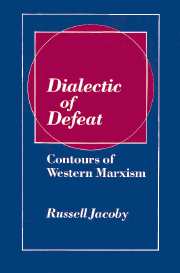Book contents
- Frontmatter
- Contents
- Preface
- Introduction
- Chapter 1 Conformist Marxism
- Chapter 2 The Marxism of Hegel and Engels
- Chapter 3 From philosophy to politics: the inception of Western Marxism I
- Chapter 4 From politics to philosophy: the inception of Western Marxism II
- Chapter 5 The subterranean years
- Chapter 6 Class unconsciousness
- Journal abbreviations used in notes
- Notes
- Index
Chapter 4 - From politics to philosophy: the inception of Western Marxism II
Published online by Cambridge University Press: 04 August 2010
- Frontmatter
- Contents
- Preface
- Introduction
- Chapter 1 Conformist Marxism
- Chapter 2 The Marxism of Hegel and Engels
- Chapter 3 From philosophy to politics: the inception of Western Marxism I
- Chapter 4 From politics to philosophy: the inception of Western Marxism II
- Chapter 5 The subterranean years
- Chapter 6 Class unconsciousness
- Journal abbreviations used in notes
- Notes
- Index
Summary
“From 1918 to the present day, every chapter of European history could be headed: The defeat of the Revolution.” So Pannekoek paraphrased Marx in 1927. By June 1924, when Lukács and Korsch were denounced as “left” Communists by the keepers of the Soviet orthodoxy, the major post–World War I upheavals were past but hardly forgotten. By their participation in these events, Lukács and Korsch each provided clues to the political significance of their philosophical writings. This explains the hostility that greeted History and Class Consciousness and Marxism and Philosophy, both published in 1923. Each book distilled past political experiences. Although neither book openly broached heretical political positions, neither could be insulated from a dense political atmosphere and past.
A philosophical denunciation of Lukács by the Russian philosopher Abram Deborin and his followers complemented the political denunciation. This philosophical confrontation etched the divergence between two Hegelian traditions. Lukács leaned heavily on Hegel. Deborin also drew on Hegel, and his “school” was identified, and eventually dismissed, as Hegelian. The Deborinites used the “scientific” Hegel to slay the “historical” Hegel of Lukács. Hegel collided with Hegel.
In an Afternote to the first edition of his book, Korsch expressed his theoretical solidarity with Lukács. Yet their theoretical closeness was partly an illusion. Their positions intersected, but each moved perpendicular to the other. Lukács shifted from a Hegelianized Marxism and “left” communism toward philosophical orthodoxy and political compromise. Korsch passed from a conventional philosophical and Marxist past to philosophical and political heresy. For an instant their paths crossed.
Neither Lukács's nor Korsch's philosophical works are discussed here in any detail; this has been done well elsewhere.
- Type
- Chapter
- Information
- Dialectic of DefeatContours of Western Marxism, pp. 83 - 104Publisher: Cambridge University PressPrint publication year: 1981



